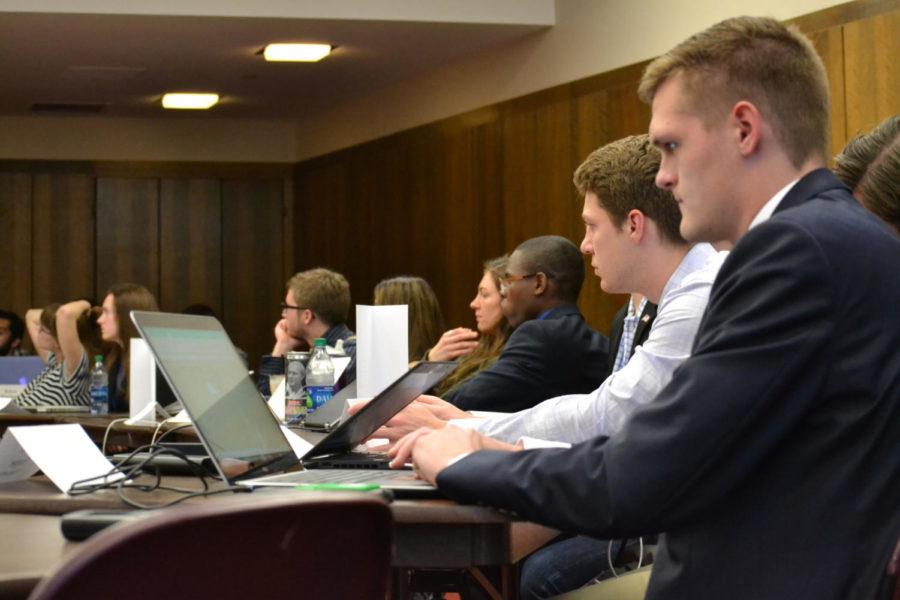- App Content
- App Content / News
- News
- News / Politics And Administration
- News / Politics And Administration / Campus
StuGov opts to discontinue New York Times subscription
Student senators listen during the Student Government meeting in the Campanile Room April 19.
November 2, 2017
After a two-hour debate on whether to renew a campus-wide digital subscription to the New York Times, Student Government ultimately decided to discontinue their contract with the news organization.
Currently, the New York Times is available to all students, faculty and staff via Student Government. It was initially funded last year for $35,000 under the previous administration for a year-long term.
Because the senate decided Wednesday to discontinue the contract, current subscriptions will expire at the end of the year.
According to data provided by the New York Times to Student Government, 2,322 students utilized the subscription over the past year resulting in a total of 126,996 interactions.
Off the bat, some senators had concerns about the renewal of the digital subscription because they were worried about the role which Student Government played in providing students with news and to what, and who, it most benefited.
“I believe this is a irresponsible way to spend our money,” Sen. Sam Rankin said, noting the New York Times provides access to 10 free articles per month — with or without a subscription.
Some senators were also concerned about the political objectivity of the New York Times and felt it was a “left-leaning” and “left-read” paper.
“We could choose better options,” Rankin said.
Sen. Isaiah Baker, who authored the legislation, disagreed with these arguments. He offered that overall the New York Times — should it have been renewed — would have served as an academic and beneficial resource to students.
“This university commits itself to bring the best of the best resources to our students… we should bring the best of the best when it comes to journalism,” Baker said. “I think it is the responsibility of the university to be funding great journalism.”
Other arguments proposed included the lagging information that went out about the original funding of the digital subscription and whether or not Student Government would have improved its efforts if funded again.
Public relations chair Ian Steenhoek said he and his team developed a promotional package plan and felt, should it have been approved, they would have been more proactive in their outreach of the New York Times digital accessibility.
Sen. Kathryn Neilson also issued a separate concern on funding the subscription, citing that while it may be a good resource for liberal arts students, it’s not as applicable in more science-related fields. She also felt it was not on the senate to provide this resource to students.
“I’m not really sure it’s Student Government’s responsibility to provide academic resources,” Neilson said.
The legislation failed 12-17-0.
Student Government also funded $4,300 to the Black Student Alliance for its third annual Winter Formal after an hour-long debate by the senate.
The legislation was met with hesitance by some of the senate after Julian Neely, who represented the Black Student Alliance and also serves as the Student Government director of diversity and inclusion, said they would be charging admission to the event.
“We’re trying to develop a scholarship from ticket sales,” Neely said, adding that the winter formal has been successful in the past and this year, the Black Student Alliance is trying to collaborate with other communities such as the LGTBQA alliance.
Because it is against Student Government bylaws to fund an event that charges students to attend, the senate amended the source of funding to be transferred from the Excellence Fund instead of the events account.
Additionally, some senators were concerned with the ticket price in general, as they felt it was indirectly covering scholarships.
“I don’t think we should cover the cost and they charge a ticket price,” Rankin said. “It’s the right idea, but I don’t think it should be where we spend our money.”
Other senators disagreed.
“Personally, I don’t have issues with the ticket sales,” Sen. Chelsea Eret said. “Our money is still going to the event itself … I think it is a good event to fund.”
To find a middle ground, Sen. Jonathan Kirner proposed an amendment that would omit the ticket fee as required for admission and instead fund the scholarship via requested donations.
Malik Burton, president of the Black Students Alliance, said they could do that but only because of how important implementing this scholarship is to him.
Neely and Sen. Dozmen Lee added, however, that this proposed amendment was disheartening to hear.
“It’s off putting to rather focus on the donation thing,” Lee said. “It doesn’t help the purpose that this whole thing [formal and scholarship] is meant to do in the first place. This is to help retain black students here at Iowa State and come here in the first place.”
Ultimately, the amendment failed and the funding request passed 22-7-0.







